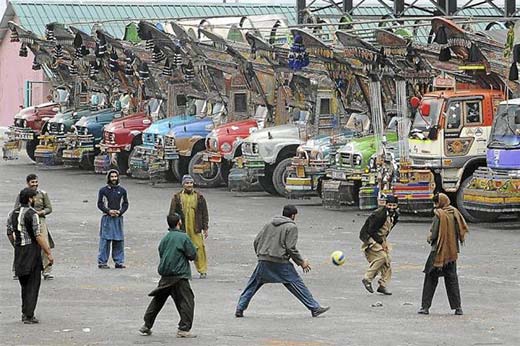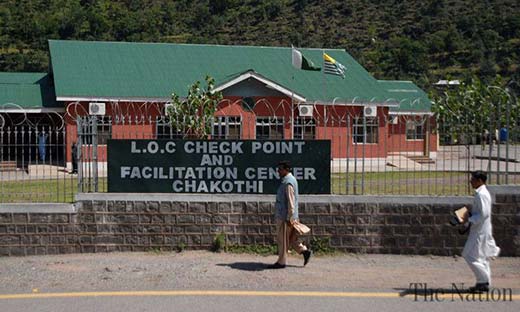At a time when PDP is reportedly seeking assurances from Narendra Modi led BJP government to strengthen the cross-LoC trade and travel, the drug haul at Slamabad may add yet another compelling factor for fast forwarding the interventions. R S Gull reports the misuse and abuse of only working Kashmir CBM by mainland India’s traders and smugglers
Clik here to view.

A file picture of stranded Pakistani truck drivers playing football at Slamabad.
Photo Courtesy: AFP
Hilal Turki was a desperate trader for all these days. A man owing his existence to the LoC barter and who has flown various world capitals for championing the cause of “this trade” has a pressing crisis to handle. On Friday (February 6, 2015) when the sleuths detected 305 small pouches of brown sugar in a kinnow consignment that had come from Chakothi in Muzaffarabad, he could barely spend time in Slamabad, the Trade Facilitation Centre where cross-LoC cargo is loaded and unloaded.
“We have nearly 200 truckloads filled with fresh fruit like banana and pineapple and any delay could destroy this,” Turki said on phone from Ramban on Monday. “It would mean a loss of nearly Rs 20 crore that will destroy all the traders who have somehow survived.” His drove to Jammu where he met state policy makers with only one request: ‘Kindly help divert the loaded trucks to take the Chakan da Bagh route.’ There was possibility of his request being accepted as, unlike Kaman crossing, the Chakan da Bagh is open for trade and travel. But Pakistan declined.
Pakistani authorities had closed the Kaman Bridge linking Slamabad (Uri) with Chakothi (Muzaffarabad) for trade or travel, after JK police detained a driver who had carried the brown sugar to Kashmir.
It was during the mandatory scanning of the merchandize that 22 PaK trucks had brought in from Chakothi, police detected 305 small packets of brown sugar, weighing 10-15 grams each, concealed intelligently in kinnow cartons. A case was registered and immediately the truck P-9627 was seized and Syed Anayat Hussain Shah, its driver, was arrested. Subsequently, three traders Zahoor Malla, Majeed Shalla and Yusuf Dar in whose name the consignment had come were also rounded up.
Later, that evening Pakistan refused to permit the return of its own fleet as a result of which all the 50 trucks of J&K that had gone with barter cargo are stuck up. As trade remained suspended, three meetings followed between J&K and PaK officials.. “They (PaK officials) said they would require evidences so that they can prosecute the narcotic supplying party and they want the case to be disposed in a time bound manner,” Talat Parvez, Deputy Commissioner Baramulla, who had a meeting with PaK officials on February 9, said. “We expect the trade to resume early as PaK have sent us a communication that they want to end the stand off.” The phones rang up Wednesday afternoon and by the midnight the trucks were changing sides. The trade resumed on Thursday and Turki tensions were over.
As police are investigating the case and have reportedly dispatched a team to Punjab to arrest a drug trader, the recurring crisis is seeking answers. Last week’s drug haul was actually the third such case in last two years and in all the cases the investigation is not complete.
The first case was reported on August 2, 2013. Then, police claimed, they had specific information that one of the few trucks that had gone to PaK with merchandize would have adequate cocaine load. When the trucks were on their way home, police stopped all trucks at a barricade and from JK02F-0127 they recovered nine pockets weighing cumulatively around 10 kilograms, which, police said would cost around Rs 10 crore in the international market.
A case (FIR No 47/2013 under sections 8/21, 29 NDPS Act) was registered at Police Station Sheeri and driver Abdul Ahad, a resident of Mawar in Handwara was arrested. Trucker had loaded bananas from Fruit Mandi in Srinagar and delivered it to Faizan Traders in Muzaffarabad. On his way back, police recovered the cocaine concealed in a spear tyre located in overhead tool box.
During interrogation, he said Shehzad was to receive the consignment. Shehzad was arrested and was portrayed as an “over ground militant”. Police said Shehzad stated that some other person was the ultimate receiver. There was no word later. Later, police rounded up Yasir Ahmad Mir son of Abdul Rehman Mir, a resident of Hazratbal in Srinagar, who was seeking bail till December 2013.
“We have already challaned the case against the driver and Yasir, a resident of Srinagar for whom the consignment had come,” a police official from Sheeri police station said. “We have found no evidence of any militant involvement as we found smuggling was carried out purely for personal reasons.”
The second instance and the most dramatic, so far, was reported on January 17, 2014 when during the routine scan police recovered 114 packets of brown sugar. Immediately, the truck driver Shafiq Awan, a resident of Shard (Muzaffarabad), who had driven truck (RIS-2137) with almond kernels and the brown sugar. Police registered case in police station Uri (FIR 6 of 2014 under sections 8/21 NDPS Act) and in immediate follow up arrested Shaowkat Habib, a Bandipore based trader, and Tariq Sheikh, whose registration Habib had used for importing kernels. While the driver pleaded innocence, the recipients of the consignment said it was supposed to be sent to Amritsar in Punjab. Police constituted a Special Investigation Team (SIT) to probe the case.
This incident triggered a crisis. Pakistan refused to permit back home 49 of the 50 trucks and one driver missing and 27 J&K trucks remained stranded in the stand-off. Initially, the then Director General Travel and Trade Authority (TATA) Brigadier (retd) Muhammad Ismail believed that Indian authorities are framing their citizen and it took four rounds of talks for 27 days between the two sides to settle the issue.
During these days, it was the local LoC-traders who were managing the routine affairs of the PaK truckers in Slamabad – their food, their bedding, tooth paste and even medical help. As the homesick drivers were overtaken by boredom in Slamabad, the host trade hired best local folk singer from Chandanwari Zahoor Geelani to entertain them. There were even protests by the families of the Kashmiri truck drivers who were stranded in Chakothi. “These 27 days meant a loss of Rs 30 crore turn over and then we had to cough up Rs 20,000 per day for managing the affairs of the stranded drivers,” one trader said.
Image may be NSFW.
Clik here to view. Eventually the law prevailed. PaKs TATA accepted that smuggling should be tackled according to the law. Trucks convoys exchanged sides finally on February 12, 2014 and the routine barter resumed. Awan is still in custody, so are the two traders who were involved in the case.
Eventually the law prevailed. PaKs TATA accepted that smuggling should be tackled according to the law. Trucks convoys exchanged sides finally on February 12, 2014 and the routine barter resumed. Awan is still in custody, so are the two traders who were involved in the case.
“We have filed the charge sheet against the three, the driver and the two traders in whose name the consignment had come,” investigating officer of the case said. Asked if they have investigated the non-local forward links, the officer said: “We are working on it.”
While the conclusive investigation into the 2014 case is still pending, the crisis returned a year after with almost the same colours. And this time again, the ultimate destination of the kinnow consignment was Punjab. Newspaper reports suggest that a close relative of the PaK firm Mir Traders had travelled on cross-LoC bus and met the two Baramulla traders who later visited Amritsar as well. Punjab’s drug baron Harjinder Singh alias Happy Singh was supposed to be the ultimate recipient of this consignment.
“We are aware that the consignment was destined to Punjab and we are in touch with our counterparts,” Kashmir Police Chief Abdul Gani Mir said. “The man who was supposed to receive the consignment is also named in the last year case but our problem is that he is an absconder.”
Interestingly, the Standard Operations Procedure (SOP) of the cross-LoC barter lacks any mechanism that will help the two sides manage such an issue. Launched in latter 2008, the exercise is a primitive barter system lacking banking, communication, currency, dispute resolution mechanism and even a formal connection between the two trading partners. Operational at Uri (Kashmir) and Poonch (Jammu), now four days a week, the barter is remote-controlled by the major exporters / importers based in Lahore and Punjab, who divert part of their cargo to make some saving from this zero-duty trade. Local traders function as their commission agents, who get cuts for receiving and dispatching the consignments.
Despite all these restrictive systems, its overall turnover from the twin windows has already crossed Rs 3600 crore.
But civil administration officials say they are playing the role they are supposed to. “I had a very good meeting with my counterparts at Kaman Bridge,” Talat said. “They (PaK officials) have made two requests. One, we must share evidence with them so that they can register case and prosecute against the supplying party. Second, they want actions (apparently against the detained driver) time-bound.” It was sharing of evidence that helped resumption of trade within six days, unlike 2014 when it took 27 days. Unlike past, Talat feels vindicated that PaK authorities did not kept the overall exercise hostage to the outcome.
But Turki says all these initiatives are quick-fixes and do not change the fundamentals of the system that rules the barter. “For all these years I am asking authorities to ponder over the fact that why a genuine trader is not resorting to such shameful acts,” Turki said. “The recent cache of drugs was recovered by police and it was the first consignment of the Baramulla trader!” Genuine traders, Turki says consider the barter as their bread and butter. “Suddenly, some people emerge with registrations and spoil our name.”
Turki’s point is that somebody in the system is helping the black sheep by getting them the mandatory registration. “Why did people who registered this firm skipped opting for a background check that the particular person is a charge-sheeter?” Turki asks. “I am asking that given the sensitivities involved with this exercise (barter) the system of registering people should be made tough but transparent and I am offering all my members to undergo it afresh.” He also believes the investigations in all the earlier two cases has not been complete and people still do not know the real people behind this.
Is anybody listening?